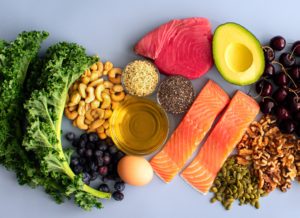Lifestyle and Living
The Brain Diet – Eat Right to Prevent Brain Disease
Oct 2022 | By Rose Reisman
Why is Brain Health so Important?
Dementia and Alzheimer’s are more prominent today than ever. There are over 500,000 Canadians living with dementia today and 65% of those are women over the age of 65 years. The prediction is the number of Canadians living with dementia will triple over the next 30 years!
The cause in the past has been associated with age, sex and genetics. Today, we know of other factors that may be preventable, including risk factors for heart disease, an unhealthy diet, lack of exercise, severe brain injury and environmental factors. Healthier lifestyles may delay and even prevent symptoms, including control of heart health, a higher education, cognitively stimulating activities, social engagement, a healthier diet, exercise, and medications to delay the onset.
The latest diet to help fight and possibly prevent brain disease is the Mind Diet. The results are outstanding, with the risk reduced by as much as 53%! Even if you only follow it 60% of the time, there are still major benefits.

“MIND” diet stands for “Mediterranean-DASH Intervention for Neurodegenerative Delay” and combines elements from the heart-healthy Mediterranean diet and blood pressure-lowering Dash diet. These diets put a greater focus on plant-based and lower-fat foods. These diets can lower blood pressure and reduce the risk of heart disease, diabetes, and several other diseases, by reducing oxidative stress and inflammation which leads to cognitive decline.
Plaque – harmful beta-amyloid proteins are one of the causes of brain disease. These proteins disrupt communication between brain cells and eventually lead to brain cell death. The antioxidants and vitamins in the MIND diet foods may help prevent the formation of these plaques.
The Mind Diet Includes:
- Three servings of whole grains daily including brown rice, quinoa and 100% whole wheat bread
- A salad and one other vegetable including kale, spinach, cooked greens, and other dark colored vegetables. Don’t eat excess starchy vegetables.
- Berries at least twice weekly – blueberries are best but other berries also benefit
- Extra virgin olive oil
- One ounce serving of nuts daily
- Beans or legumes every other day
- Fish once weekly, preferably fatty fish such as salmon, sardines, and mackerel with omega 3 fatty acids
- Poultry twice weekly – without skin
- A 5 oz glass of red or white wine daily or grape juice
The Foods to Limit:
- No more than 1 tbsp butter or margarine daily
- Saturated fats double the risk of dementia
- Cheese, fried foods, and fast foods, no more than once per week.
- Red meat – less than three times weekly, including beef, pork and lamb
- Avoid pastries and sweets – no more than 3 times weekly
What Other Factors Can Prevent and Reduce the Risk?
Staying socially active reduces depression and isolation, which can lead to dementia. This can easily be achieved by eating with others, joining clubs and activities, volunteering, and most importantly, keeping a regular schedule with others.
If you smoke, you have a 45% higher risk of getting dementia, since smoking affects the heart and blood vessels. The toxins also increase inflammation, another factor for dementia and Alzheimer’s. If you’re smoking in midlife, there’s a 40% increase in Alzheimer’s 20 years later.
There are many ways to challenge your brain. Try playing games that you like or try new ones; listen to music; start learning a new language and most important is to change up your daily routines so the brain stays active. All these ideas will increase your cognitive reserve, memory, decision making and observation.
In Summary…
For optimal brain health, remember these tips:
- Eat according to the Mind Diet
- Keep up social interaction
- Keep a schedule of activities
- Exercise at least 3 -4 times weekly
- Maintain a healthy weight
 Rose Reisman is a successful entrepreneur, catering and cooking guru, and now a personal trainer. You can view more of her work at The Art of Living Well.
Rose Reisman is a successful entrepreneur, catering and cooking guru, and now a personal trainer. You can view more of her work at The Art of Living Well.

